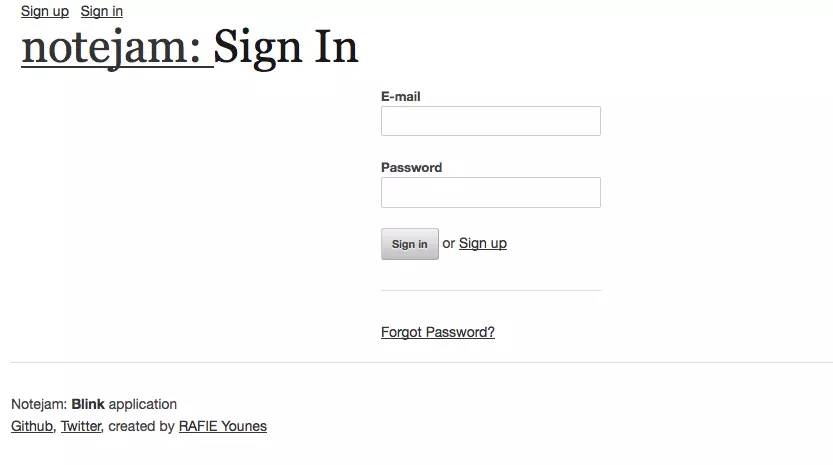Blink: A High-Performance PHP Framework
You've likely heard of Lumen, Silex, and Slim. Now, meet Blink, a new PHP framework designed for high-performance applications demanding significant server resources. This article explores Blink's capabilities and demonstrates its use through a sample "Notejam" application.

Blink leverages the Swoole PHP extension to achieve its performance goals. Let's dive into the details.
Key Features:
- Performance Optimization: Blink utilizes Swoole for enhanced performance, making it ideal for resource-intensive applications.
- Installation: Installation is via Composer. Note: The current Swoole version requires PHP 5 (not compatible with PHP 7).
- Flexibility: While lacking default templating and database management, Blink seamlessly integrates with popular choices like Twig and Eloquent.
- Notejam Application Example: This article guides you through building a Notejam app showcasing user authentication, session management, and CRUD operations for notes and pads.
- Resource Efficiency: The combined power of Blink and Swoole minimizes server load by keeping application resources active throughout the application's lifecycle.
- Community Driven: As a relatively new framework, Blink welcomes community contributions to documentation and feature development.
Swoole Extension Installation:
Blink's performance relies on the Swoole extension. This guide uses PEAR on Ubuntu 14.04 with a LAMP setup (using Vaprobash; see the project's Vagrantfile for details). (Note: Swoole's current incompatibility with PHP 7 is a factor in this setup choice.)
sudo apt-get update sudo apt-get install php-pear php5-dev libcurl3-openssl-dev sudo pecl install swoole
After installation, remember to add extension=swoole.so to your php.ini file. Verify the extension's loading with:
php -m | grep 'swoole'
(Current Swoole version: 1.7.22-alpha, incompatible with PHP 7; future versions aim to address this.)
Installing Blink:
Use Composer:
composer create-project --prefer-dist blink/seed
Start the server:
php blink server serve
Access the application at http://localhost:7788 (or adjust the port as described below).

Configuration:
While Blink doesn't offer command-line port specification, you can modify the port in src/config/server.php:
<?php return [
'class' => '\blink\server\SwServer',
'bootstrap' => require __DIR__ . '/../bootstrap.php',
'host' => '0.0.0.0',
'port' => 8080,
];
Remember to restart the server after making changes. The config directory also houses application and service configurations.
Building the Notejam App:
The Notejam app (available on Github) includes:
- Sign-in (with password reset)
- Sign-up
- Account settings (password change)
- Note and pad management
Integrating Twig (Templating Engine):
Blink doesn't include a default templating engine; we'll use Twig. Modify src/bootstrap.php and add src/bindings.php:
sudo apt-get update sudo apt-get install php-pear php5-dev libcurl3-openssl-dev sudo pecl install swoole
php -m | grep 'swoole'
Integrating Eloquent (Database Management):
For database interaction (users, notes, pads), we'll use Eloquent. Install via Composer:
composer create-project --prefer-dist blink/seed
Then, configure Eloquent in src/bindings.php:
php blink server serve
(Database migrations are handled via src/console/MigrateCommand.php and src/config/app.php.)
Routing, Controllers, and Views:
Routes are defined in src/http/routes.php. Controllers reside in src/http/controllers. Views use Twig templates. The article provides detailed examples of these components for the Notejam app's functionality (sign-up, sign-in, settings, note management). Middleware is used for authentication and authorization.
Sessions and Cookies:
Blink doesn't automatically handle PHP sessions; manual management (using the request object) is necessary.
Conclusion:
Blink, while still in early development, offers a compelling high-performance alternative. The community is encouraged to contribute to its growth and improvement.





The provided FAQs are already comprehensive and well-structured. No further modifications are needed.
The above is the detailed content of Can PHP Be Even Faster? Light-Speed with the Blink Framework. For more information, please follow other related articles on the PHP Chinese website!

Hot AI Tools

Undress AI Tool
Undress images for free

Undresser.AI Undress
AI-powered app for creating realistic nude photos

AI Clothes Remover
Online AI tool for removing clothes from photos.

Clothoff.io
AI clothes remover

Video Face Swap
Swap faces in any video effortlessly with our completely free AI face swap tool!

Hot Article

Hot Tools

Notepad++7.3.1
Easy-to-use and free code editor

SublimeText3 Chinese version
Chinese version, very easy to use

Zend Studio 13.0.1
Powerful PHP integrated development environment

Dreamweaver CS6
Visual web development tools

SublimeText3 Mac version
God-level code editing software (SublimeText3)

Hot Topics
 What are some best practices for versioning a PHP-based API?
Jun 14, 2025 am 12:27 AM
What are some best practices for versioning a PHP-based API?
Jun 14, 2025 am 12:27 AM
ToversionaPHP-basedAPIeffectively,useURL-basedversioningforclarityandeaseofrouting,separateversionedcodetoavoidconflicts,deprecateoldversionswithclearcommunication,andconsidercustomheadersonlywhennecessary.StartbyplacingtheversionintheURL(e.g.,/api/v
 How do I implement authentication and authorization in PHP?
Jun 20, 2025 am 01:03 AM
How do I implement authentication and authorization in PHP?
Jun 20, 2025 am 01:03 AM
TosecurelyhandleauthenticationandauthorizationinPHP,followthesesteps:1.Alwayshashpasswordswithpassword_hash()andverifyusingpassword_verify(),usepreparedstatementstopreventSQLinjection,andstoreuserdatain$_SESSIONafterlogin.2.Implementrole-basedaccessc
 What are the differences between procedural and object-oriented programming paradigms in PHP?
Jun 14, 2025 am 12:25 AM
What are the differences between procedural and object-oriented programming paradigms in PHP?
Jun 14, 2025 am 12:25 AM
Proceduralandobject-orientedprogramming(OOP)inPHPdiffersignificantlyinstructure,reusability,anddatahandling.1.Proceduralprogrammingusesfunctionsorganizedsequentially,suitableforsmallscripts.2.OOPorganizescodeintoclassesandobjects,modelingreal-worlden
 What are weak references (WeakMap) in PHP, and when might they be useful?
Jun 14, 2025 am 12:25 AM
What are weak references (WeakMap) in PHP, and when might they be useful?
Jun 14, 2025 am 12:25 AM
PHPdoesnothaveabuilt-inWeakMapbutoffersWeakReferenceforsimilarfunctionality.1.WeakReferenceallowsholdingreferenceswithoutpreventinggarbagecollection.2.Itisusefulforcaching,eventlisteners,andmetadatawithoutaffectingobjectlifecycles.3.YoucansimulateaWe
 How can you handle file uploads securely in PHP?
Jun 19, 2025 am 01:05 AM
How can you handle file uploads securely in PHP?
Jun 19, 2025 am 01:05 AM
To safely handle file uploads in PHP, the core is to verify file types, rename files, and restrict permissions. 1. Use finfo_file() to check the real MIME type, and only specific types such as image/jpeg are allowed; 2. Use uniqid() to generate random file names and store them in non-Web root directory; 3. Limit file size through php.ini and HTML forms, and set directory permissions to 0755; 4. Use ClamAV to scan malware to enhance security. These steps effectively prevent security vulnerabilities and ensure that the file upload process is safe and reliable.
 What are the differences between == (loose comparison) and === (strict comparison) in PHP?
Jun 19, 2025 am 01:07 AM
What are the differences between == (loose comparison) and === (strict comparison) in PHP?
Jun 19, 2025 am 01:07 AM
In PHP, the main difference between == and == is the strictness of type checking. ==Type conversion will be performed before comparison, for example, 5=="5" returns true, and ===Request that the value and type are the same before true will be returned, for example, 5==="5" returns false. In usage scenarios, === is more secure and should be used first, and == is only used when type conversion is required.
 How can you interact with NoSQL databases (e.g., MongoDB, Redis) from PHP?
Jun 19, 2025 am 01:07 AM
How can you interact with NoSQL databases (e.g., MongoDB, Redis) from PHP?
Jun 19, 2025 am 01:07 AM
Yes, PHP can interact with NoSQL databases like MongoDB and Redis through specific extensions or libraries. First, use the MongoDBPHP driver (installed through PECL or Composer) to create client instances and operate databases and collections, supporting insertion, query, aggregation and other operations; second, use the Predis library or phpredis extension to connect to Redis, perform key-value settings and acquisitions, and recommend phpredis for high-performance scenarios, while Predis is convenient for rapid deployment; both are suitable for production environments and are well-documented.
 How do I perform arithmetic operations in PHP ( , -, *, /, %)?
Jun 19, 2025 pm 05:13 PM
How do I perform arithmetic operations in PHP ( , -, *, /, %)?
Jun 19, 2025 pm 05:13 PM
The methods of using basic mathematical operations in PHP are as follows: 1. Addition signs support integers and floating-point numbers, and can also be used for variables. String numbers will be automatically converted but not recommended to dependencies; 2. Subtraction signs use - signs, variables are the same, and type conversion is also applicable; 3. Multiplication signs use * signs, which are suitable for numbers and similar strings; 4. Division uses / signs, which need to avoid dividing by zero, and note that the result may be floating-point numbers; 5. Taking the modulus signs can be used to judge odd and even numbers, and when processing negative numbers, the remainder signs are consistent with the dividend. The key to using these operators correctly is to ensure that the data types are clear and the boundary situation is handled well.






